

Are We Building Back Better? Evidence from 2020 and Pathways for Inclusive Green Recovery Spending. Información estadística para el análisis del impacto de la crisis COVID-19. Statistical information for the analysis of the impact of the COVID-19 crisis This section collects information for the study of different phenomena that may be of interest to analyse the economic, social and demographic situation of the health alert period caused by the effects of COVID-19.
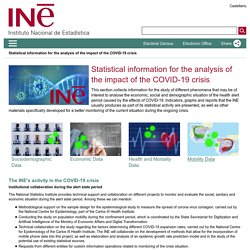
Indicators, graphs and reports that the INE usually produces as part of its statistical activity are presented, as well as other materials specifically developed for a better monitoring of the current situation during the ongoing crisis. The INE's activity in the COVID-19 crisis Institutional collaboration during the alert state period The National Statistics Institute provides technical support and collaboration on different projects to monitor and evaluate the social, sanitary and economic situation during the alert state period.
Impact on Statistical Activity. Foresight: These scenarios threaten humanity. Da sind ein Mann und ein Kind.
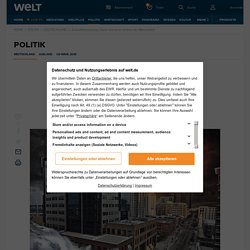
Mühsam stapfen sie durch eine verwüstete Landschaft unter verdunkeltem Himmel. Alle Gebäude sind zerstört und geplündert, Nahrung ist kaum noch zu finden. 1% of people cause half of global aviation emissions – study. Frequent-flying “‘super emitters” who represent just 1% of the world’s population caused half of aviation’s carbon emissions in 2018, according to a study.
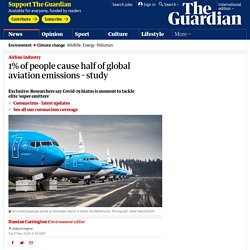
Airlines produced a billion tonnes of CO2 and benefited from a $100bn (£75bn) subsidy by not paying for the climate damage they caused, the researchers estimated. The analysis draws together data to give the clearest global picture of the impact of frequent fliers. Only 11% of the world’s population took a flight in 2018 and 4% flew abroad. US air passengers have by far the biggest carbon footprint among rich countries. Its aviation emissions are bigger than the next 10 countries combined, including the UK, Japan, Germany and Australia, the study reports. Private jet bookings soar as wealthy flee second England lockdown. Wealthy people in England are booking private jets to escape the lockdown set to be introduced on Thursday, according to jet brokers.
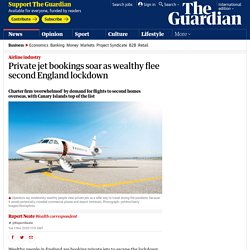
Air Partner, one of the biggest aircraft charter firms, said there had been a “sharp rise” in private jet bookings “out of the country before Thursday”, as people look to avoid the lockdown and instead spend the time overseas. The company, which supplies planes to Premier League footballers, celebrities, the royal family and six out of the eight governments in the G8, said it had been overwhelmed with enquiries from wealthy people seeking to escape the UK for second homes overseas. “Many of these flight enquiries are for individuals wishing to go to their second homes in Europe, with the Canary Islands, which are still warm at this time of year, being the most sought-after destination,” the company said in a statement. Air Partner said that to depart before lockdown for five people from Biggin Hill airport to Tenerife would cost around £24,000 one-way. Tackling coronavirus (COVID‑19) Contributing to a global effort. How bike-friendly ‘slow streets' are changing cities - BBC Worklife.
Air Travel in crisis. Growing fear of public transportation. Corona-Pandemie stellt bisherige Stadtplanung in Frage. Die Corona-Pandemie erschwert vor allem das Leben der Menschen in den großen Städten.
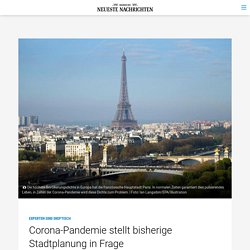
Um den Flächenfraß zu stoppen und wegen der schlimmen Wohnungsnot sind die Städte in den vergangenen Jahren zum Teil hemmungslos nachverdichtet worden. Das wird bei Infektionskrankheiten zum Problem. Die Stadt könnte nach Corona völlig anders aussehen. Das Credo der Stadtplaner lautete bisher: Nachverdichtung, fast um jeden Preis. The rise of online learning during the COVID-19 pandemic. The COVID-19 has resulted in schools shut all across the world.
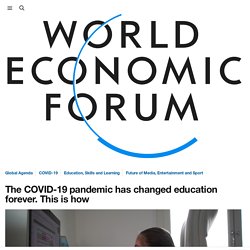
Globally, over 1.2 billion children are out of the classroom. As a result, education has changed dramatically, with the distinctive rise of e-learning, whereby teaching is undertaken remotely and on digital platforms. Research suggests that online learning has been shown to increase retention of information, and take less time, meaning the changes coronavirus have caused might be here to stay. While countries are at different points in their COVID-19 infection rates, worldwide there are currently more than 1.2 billion children in 186 countries affected by school closures due to the pandemic. In Denmark, children up to the age of 11 are returning to nurseries and schools after initially closing on 12 March, but in South Korea students are responding to roll calls from their teachers online. Covid-19 coronavirus led to more Black deaths because of housing discrimination. One thing hasn’t changed as a new surge of coronavirus cases has swelled across the United States: Black Americans continue to disproportionately get infected by and die from this novel pathogen.

The Los Angeles County health department reported this week that Black residents were dying at twice the rate its white residents were. The same is true of Black Alabamans. In Florida, Black people account for a higher share of Covid-19 hospitalizations and deaths than their share of the population. Seite 2 - Desinfektionsmittel: Das Engelsgesicht der harten Chemie. Das zweite großflächig genutzte Desinfektionsmittel, Aktivchlor aus Natriumhypochlorid, umgangssprachlich oft als Chlorbleiche bezeichnet, wurde als Wirkstoff erst im vergangenen Jahr genehmigt.

3D printers are on the front lines of the COVID-19 pandemic. OnOn March 20th, as the coronavirus situation in New York City hurtled toward full-blown crisis, Madiha Choksi was packing a taxi with two Flashforge 3D printers and as much filament as she could fit.
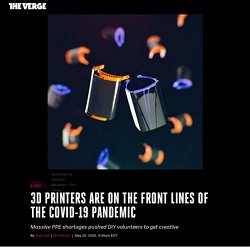
Choksi, a librarian specializing in research and educational technology, had received an urgent email the night before from Pierre Elias, a cardiology fellow at NYP-Columbia University Medical Center. Elias desperately needed to produce more protective gear for hospital workers treating COVID-19 patients. He hoped Choksi, the administrator for Columbia University’s 3D printing lab, might be able to help.
Pandemic alert and monitoring system. Greening the transport sector in the post COVID-19 recovery could create up to 15 million jobs worldwide. Investment in transforming the transport sector could create millions of new jobs and help countries move to greener, healthier economies, says new report.
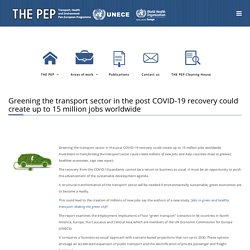
The recovery from the COVID-19 pandemic cannot be a return to business as usual. It must be an opportunity to push the advancement of the sustainable development agenda. A structural transformation of the transport sector will be needed if environmentally sustainable, green economies are to become a reality. Eight Emerging Lessons: From Coronavirus to Climate Action. COVID-19 Archives - POST. 2020 05 05 monitoring sars cov 2 v odpadnich vodach. Let’s make post- COVID-19 mobility more sustainable: UNECE issues guidance on reducing car use in cities. It is clear that the recovery from the COVID-19 pandemic cannot simply be a return to business as usual. With the mobility that societies take for granted severely limited in many countries due to emergency measures, one area that calls for a critical re-assessment is how we can shift to more sustainable and efficient mobility.
From tackling deadly air pollution to lowering carbon emissions and reducing congestion, the benefits of cutting down car use have made it a priority in many cities’ efforts to date. FTA Monitoringbericht kurz Juni 2020 bf. JRC research, actions and publications on COVID-19. 095 digitales lernen. 091 europ resilienz. Will Covid-19 Hasten The Demise Of Fossil Fuels? The fossil fuel industry has faced serious headwinds for several years, but the rise of renewables combined with the fall in consumption as a consequence of the global Covid-19 pandemic is pushing it over the edge and into “terminal decline”. Although global coal consumption continues to grow slowly, its use has peaked in developed regions.
According to the 2020 BP Statistical Review of World Energy, U.S. coal consumption fell by more than 40% in the past decade, while in the EU it has seen a nearly 27% drop. The primary culprits behind coal’s decline are competition from cheap natural gas brought on by the shale gas boom in the U.S., as well as a surge of renewable capacity aided by legislation aimed at curbing carbon dioxide emissions. Victims of Their Own Success But the natural gas and subsequent oil boom were victims of their own success. The fossil fuel industry has faced an oversupply problem, as well as a public relations problem. Post-pandemic ‘green shift’ in transport could create up to 15 million jobs. The study argues that recovery from the crisis cannot mean a return to “business as usual” for a sector that accounts for more than 60 million jobs globally.
Instead, it provides an opportunity to advance the collective effort to achieve sustainable development for all people and the planet, by 2030 through the SDGs. “Pursuing the goal of an environmentally sustainable and inclusive society requires a structural transformation of the economy, including both changes in the products and services on offer and production processes”, said Catherine Saget, Team Leader at the International Labour Organization (ILO), which co-authored the report.
Corona Sustainability Compass - Der Wissenschaftsblog von Umweltbundesamt, Future Earth, International Science Council und Stiftung 2° Update 04.05. - Corona und die Auswirkungen auf die Luftqualität. Yuval Noah Harari on COVID-19: ′The biggest danger is not the virus itself′ DW: Professor Harari, we're in the midst of a global pandemic. What concerns you most about how the world is changing? Yuval Noah Harari: I think the biggest danger is not the virus itself.
Humanity has all the scientific knowledge and technological tools to overcome the virus. The really big problem is our own inner demons, our own hatred, greed and ignorance. I'm afraid that people are reacting to this crisis not with global solidarity, but with hatred, blaming other countries, blaming ethnic and religious minorities. But I hope that we will be able to develop our compassion, and not our hatred, to react with global solidarity, which will develop our generosity to help people in need. We face, as you've said, the choice between totalitarian surveillance and citizen empowerment. It's not completely out of your control, at least in a democracy. How do I know whom, or what, to trust? First, you have past experience. Exactly. COVID Action Platform. Coronavirus: world treating symptoms, not cause of pandemics, says UN. The world is treating the health and economic symptoms of the coronavirus pandemic but not the environmental cause, according to the authors of a UN report.
As a result, a steady stream of diseases can be expected to jump from animals to humans in coming years, they say. After the Pandemic: Which Future? Dear Friends, The pandemic jolts the present and leaves the future more uncertain and contested than ever. We are witness to a rupture in time that, by upending entrenched patterns and mindsets, changes the historical trajectory. Covid-19 et comportements alimentaires - Covid-19 et comportements alimentaires.
[SYNTHÈSE] Crise du Covid-19 : quels scénarios pour les 18 prochains mois. 10 thesis for a post Corona world (german) » New film: The Great Transformation: Futurist Gerd Leonhard on how #covid19 will impact our immediate future. There is a time before Corona, and there is a time after Corona. We are entering what I call *The Great Transformation*. Huge challenges and many hardships are certain yet this total reset will also catalyse many new beginnings. (Watch the film directly on Youtube, or click PLAY below) NitroPep- Technology for surfaces using molecular spikes to rupture viruses on surfaces. Sober consumption: a trend that the Covid-19 crisis could amplify. Shaping the post-Corona planet: knowledge on Europe's environment and climate. Everything around us has changed at an unprecedented pace in a short space of time: social interactions, work life, education, vacations, jobs opportunities and digital connectivity.
The future ahead is equally filled with many uncertainties. But in these trying times, we should never forget the impressive strength, resilience and solidarity we have demonstrated as individuals, families and as part of a global community. Together we can act, innovate, adapt and move forwards. We need to do that in a sustainable way. Bottom Up! Voci - Discussion group on the post-covid situation in cities, architecture, use of public space etc. Sum studio's home-grown cellulose face mask promotes biodesign. Coronavirus-Ausgangssperre gibt Tieren eine seltene Pause von Lärmverschmutzung.
Weniger Verkehrsaufkommen wegen der Ausgangssperren durch das Coronavirus bedeuten auch weniger Abgasverschmutzung.